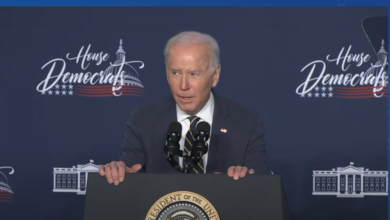Majority Decision in King v. Burwell Eviscerates Separation of Powers
According to the Fabian socialist-based government in George Orwell’s 1984, war is peace and freedom is slavery.
And according to the democratically-conscious Chief Justice John Roberts Supreme Court, a fee is a tax and state means federal.
The Court’s 6-3 ruling in King v. Burwell upholding the legality of subsidies in states that refused to set up a federal exchange is hardly shocking in consideration of National Federation of Independent Business v. Sebelius, but it is nevertheless disheartening.
Even as Jonathan Gruber’s important role in the construction of the legislation becomes more evident, the Court bent over backwards to accommodate the legislature’s supposed oversight in using imprecise language.
Gruber, of course, revealed the unspoken secret of the law- that is was written so states that failed to set up exchanges would be taxed without receiving any of the benefits, a scare tactic meant to raise the specter of public anger and force Republican governors into complying:
Roberts, however, in affirming the Fourth Circuit Court of Appeals ruling that the subsidies were legal, went to great lengths to ignore the public record of fact and accommodate the stated intent of the administration, claiming in his opinion:
“we must respect the role of the Legislature, and take care not to undo what it has done. A fair reading of legislation demands a fair understanding of the legislative plan. Congress passed the Affordable Care Act to improve health insurance markets, not to destroy them. If at all possible, we must interpret the Act in a way that is consistent with the former, and avoids the latter.”
There is absolutely no legal rationale in this decision; there is instead sycophantic sophistry. Yet, the Court’s decision to interpret the Act in a way that clearly goes beyond the plain language of the statute does not respect the role of the Legislature; it supersedes it, continuing a precedent established by the decision to call the individual mandate a “tax,” despite the clear insistence by the Obama administration that this was not the case.
The Court’s decision by itself is troubling, but the majority’s rationale is even more so because it is a complete evisceration of the separation of powers and vastly re-interprets the meaning of judicial review, which was established as the primary responsibility of the Court in Marbury v. Madison.
There has been much talk of the King v. Burwell ruling being purely about statutory interpretation. This was obliterated by the centrality of Congressional intent to Robert’s ruling.
But, the Court’s guidance by statutory interpretation is in itself problematic. In Federalist 78, Alexander Hamilton explained the necessity of the chief judicial body being guided by the Constitution above other duly enacted laws:
“A constitution is, in fact, and must be regarded by the judges as, a fundamental law. It, therefore, belongs to them to ascertain its meaning, as well as the meaning of any particular act proceeding from the legislative body. If there should happen to be an irreconcilable variance between the two, that which has the superior obligation and validity ought, of course, to be preferred; or, in other words, the Constitution ought to be preferred to the statute, the intention of the people to the intention of their agents..”
The original intent of the judicial branch, as laid out by Article III and further defined by Marbury v. Madison, is strict Constitutional interpretation. Its articles and clauses are the lodestone for the justice’s rationale. But the introduction of case law and precedent caused the Court to drift away from its purpose.
The Court’s two rulings upholding the ACA are a tidal wave, pushing the power of the justices into new territory. They have invested themselves with interpretive powers that too closely mimic those given solely to the legislature.
But then, maybe James Madison was merely imprecise in his language when he laid out the carefully delineated system of checks and balances in the Constitution.




